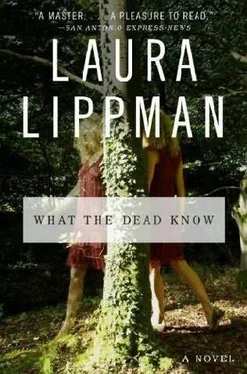Suddenly there was a dead space beneath the plane, with almost no lights shining at all, an abyss. The plane had turned and was heading up the Chesapeake Bay. Although the final descent was quite smooth, Miriam’s stomach twisted once again from that strange turista -like ailment she had never known in all her years in Mexico, and she fumbled in the seat pocket for an airsickness bag, but there wasn’t one. Perhaps airlines didn’t provide them anymore, perhaps people were supposed to be able to fly without getting ill, at least in first class. Or someone had taken it and the overworked flight attendants hadn’t noticed. Miriam did the only thing possible, given the circumstances. She swallowed.
PART VIII. THINGS AS THEY ARE (1989)
The last leg of Miriam’s trip to language school was complicated by the fact that she didn’t yet speak Spanish. A true Catch-22 , she thought as she stood in the cavernous, chaotic bus station, where she had managed to purchase her first-class ticket to Cuernavaca with a minimum of misunderstanding. She had gotten through customs and finessed the Mexico City cab system to get there and was feeling very proud of herself up until the moment she left the ticket counter, her bus ticket for Cuernavaca clutched in her trembling hand.
But how to find the right bus among those lined up in the lanes outside, rumbling and belching black smoke? The announcements on the PA system were nothing more than bursts of static, incomprehensible in any language. There was no information booth that she could find, no one seemed to speak English, and the halting Spanish she had acquired in her introductory course back in Texas was of little use. People stared at her blankly when she stammered out her questions, then released a torrent of words, peppering her with sounds. They wanted to help. Their faces were kind, their gestures affectionate and warm. They simply did not understand anything she said.
She studied her ticket, noted that it was blue, then began looking at the tickets in others’ hands. There was a woman whose ticket was also blue, a tired-looking woman with the kind of profile that one saw in Mayan art-the noble, hawklike nose, the flat forehead.
“ Cuernavaca?” Miriam asked.
The woman considered Miriam’s question cautiously, as if she had known a lifetime of simple questions that turned out to be sinister and dangerous.
“ Sí ,” she said. “ Ya me voy .” She turned away, as if she thought Miriam’s question had been a subtle order to move along. When she glanced back over her shoulder and saw Miriam following her, she picked up her pace, which was difficult as she was traveling with two large shopping bags. But it was more difficult for Miriam, with her suitcase strapped to a set of rollers, and she began to fall behind. The woman glanced back again, saw Miriam struggling, then registered the ticket in her hand, that it was the same as hers.
“ Cuernavaca ,” she said, understanding. She waited for Miriam to catch up with her, then led her to the proper bus. “ Cuernavaca,” she repeated, smiling, as if Miriam were a child learning an essential word. “ Cuernavaca,” she said upon boarding, settling in a seat across the aisle. Then she dared a new bit of vocabulary, words that Miriam knew she should she know, words that she had learned at some point, but were lost to her. The woman tried again, speaking more slowly. Miriam laughed and threw up her hands, mocking her own ignorance. The woman smiled and laughed, too, seemingly relieved that she would not have to try to make conversation with this gringa stranger for the hour’s journey south. She settled back in her seat, rummaged through one of her bags, and pulled out something wrapped in waxed paper. She peeled the paper away, revealing a mango on a stick coated with a thick sprinkling of what appeared to be chili pepper. Now that she was safe on the bus, almost at her destination, Miriam was relaxed enough to find this wondrous. If she had seen it just five minutes earlier, when she was still lost, it would have struck her as disgusting.
¿De dónde es ? That was what the woman had asked. Where are you from ? It was too late to answer, and even if Miriam did-what would she say? She had boarded a plane in Austin this morning. Did that make her a Texan? Or should she say Canada, the place of her birth? Since her parents had died, she had no ties there. She still thought of Baltimore as home, but the fact was she had lived there a mere fifteen years, while Texas had been her home for the last thirteen. Where was she from ? The only thing she was sure of was that she was getting out of Texas just in time, racing the recession as if it were an unruly wave sweeping up a beach.
She had been lucky, not smart. She had sold her own house eighteen months earlier, before the market began its precipitous slide. At the same time, she had divested herself of some longtime investments she had inherited from her parents. But it wasn’t that she had predicted the stock market collapse in 1987 or Texas ’s real-estate woes on its heels. She had been toying with the idea of early retirement, so she had moved her money to CDs and other laughably conservative investments. And she hadn’t bought a new house because she wasn’t sure she wanted to stay in Texas. Her money would go so much further somewhere else. Lots of people didn’t want to stay in Texas just now, and these people had cried in Miriam’s office over the past few months, baffled by the concept of negative equity. “How can we owe ?” one young woman had sobbed. “We bought the house, we made our payments, and now we’re selling it. So why do we owe seven thousand dollars?” Bolder sellers tried to suggest that a Realtor should not be paid if the deal yielded no profit for them. It was an ugly time.
But even if things had been booming, Miriam would have made the same decisions. Her pathologically optimistic partners thought she was crazy, taking four weeks off just as the spring season was gearing up. “How can you leave now?” they asked. “Things are bound to pick up.” They would think she was crazier still if they knew she didn’t plan to return to work ever. She was going to study Spanish in a month-long immersion course, then find a place to live. In the United States, such a dream was at least a decade away. But here in Mexico, where a dollar currently bought you sixteen hundred pesos, it could be done. Not that she was sold on Mexico. Belize was a possibility, or Costa Rica.
In the blur of preparations for the first leg of her trip, she had not focused on the date right away. There had been so much to do, so many signatures, even more than a settlement required. Traveler’s checks, the sublease agreement on her apartment, the sale of her car. (That alone should have alerted her coworkers she wasn’t returning. Who could live in Texas without a car?) But three weeks ago, when she finally made the plane reservation, the date, March 16, had stared up at her from her Filofax. She decided it was a good omen, getting out of the country before another March 29.
THE BUS WAS WINDING through a mountain pass, and Miriam noticed the tiny white crosses along the roadside. Come to think of it, weren’t buses always plunging down hills in Mexico? Such stories seemed a staple of the news. Bus accidents and mudslides and typhoons and earthquakes. On the cab ride from the airport to the bus station, she had seen abandoned buildings from the Mexico City earthquake of 1987, their fates still undecided. Most of the people she knew loved CNN, felt that it was an intellectual badge of honor to watch a cable channel with so much foreign news. Some called it the Crisis News Network, but Miriam felt that Ted Turner’s ultimate subtext was, Be Glad You’re Here. The rest of the world was shown as wild and unpredictable, prone to disaster and strife and civil war. Spend enough time with CNN and the United States seemed reassuringly stable.
Читать дальше












